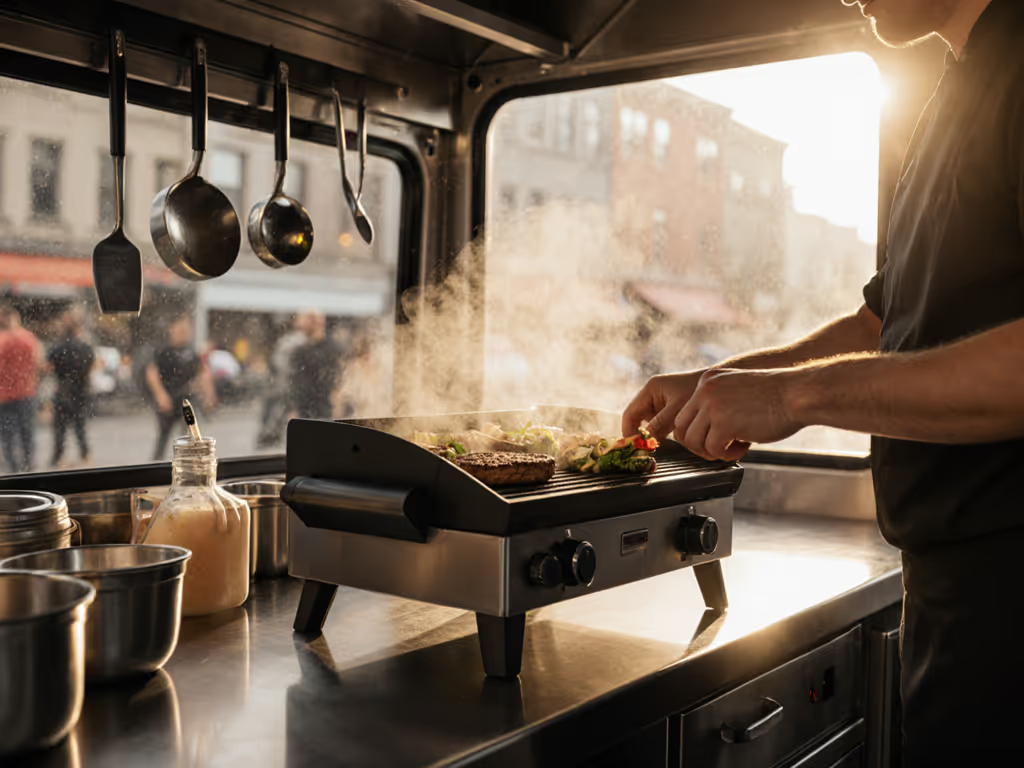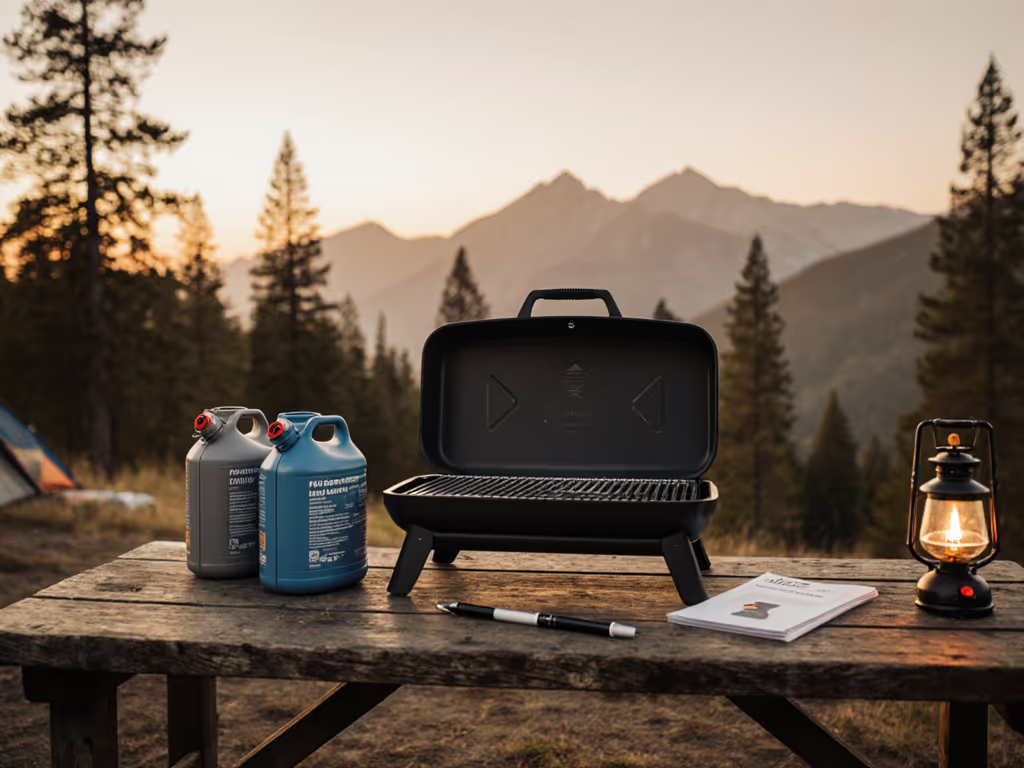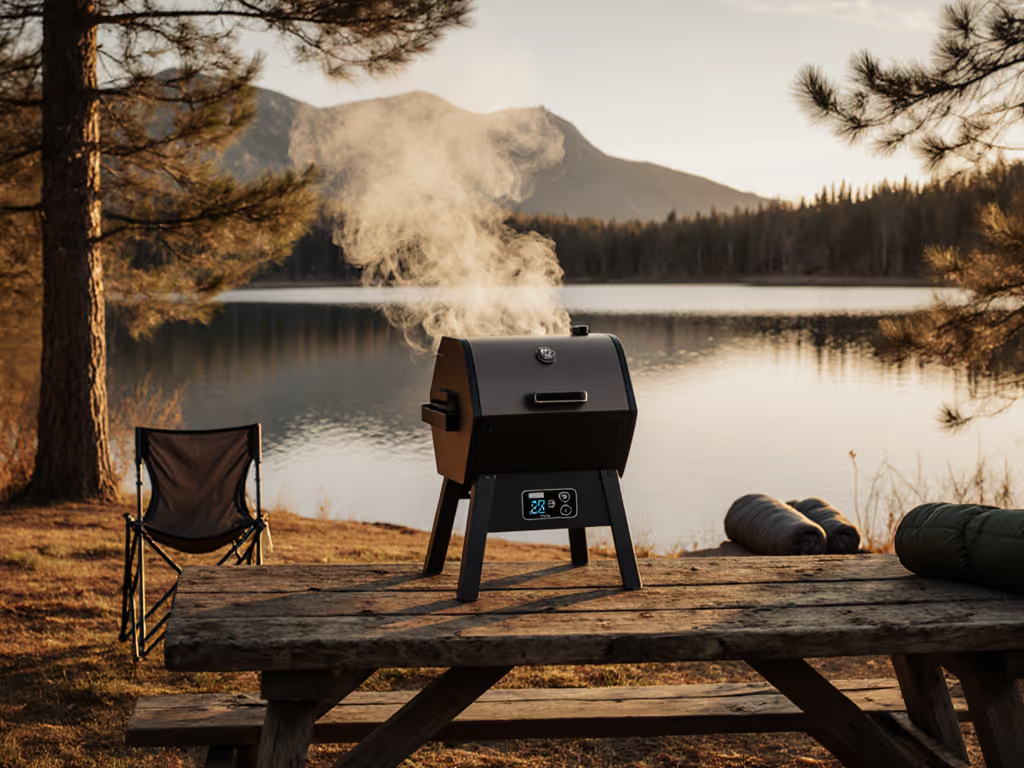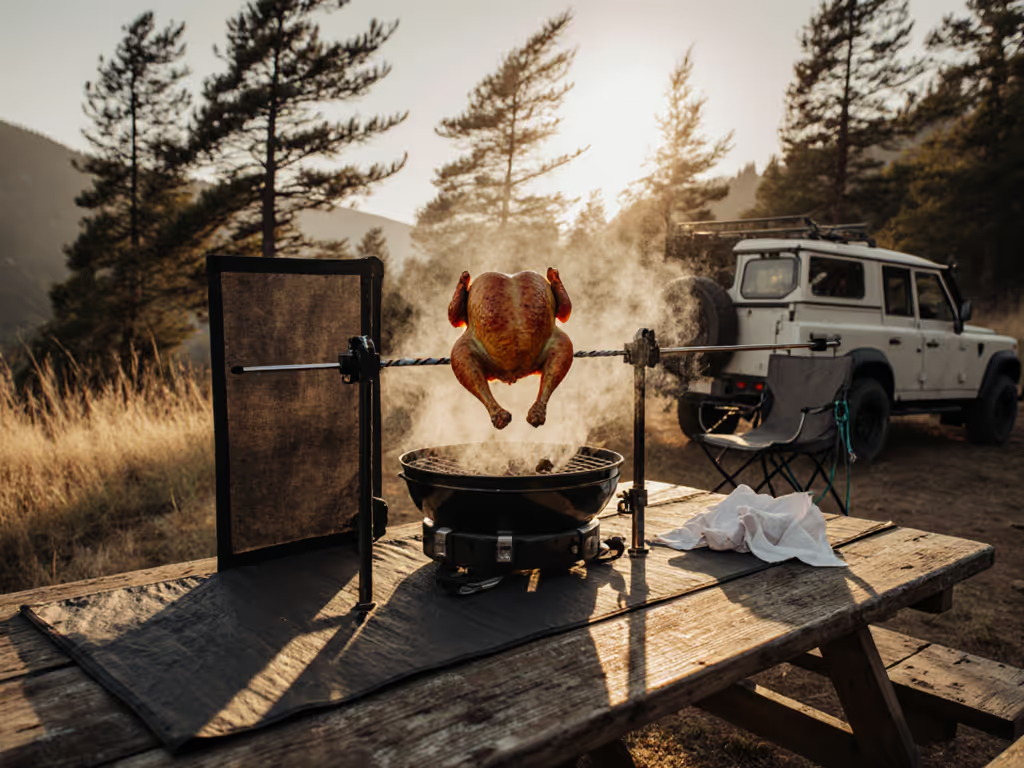
Portable Pellet Grill vs Gas: Smoke Flavor Without Bulk
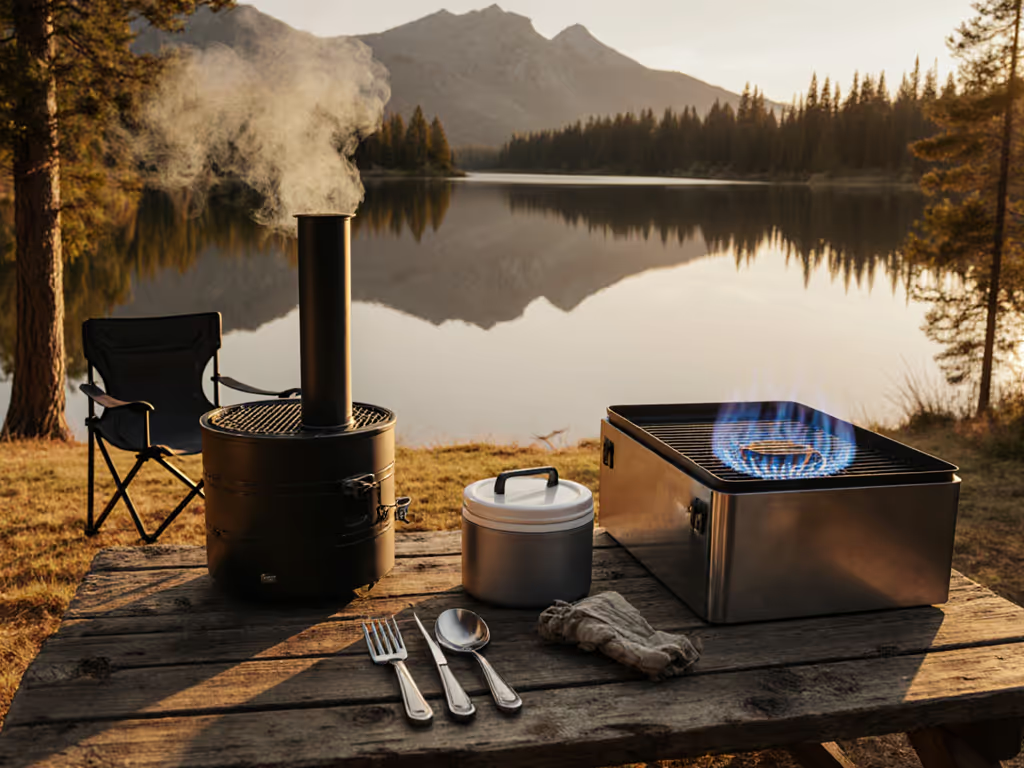
When your kayak sling sits empty beside a fire ban sign or your tailgate party faces a charcoal prohibition, the right choice between a portable pellet grill and pellet vs gas portable options becomes critical. As someone who's navigated shifting regulations from riverbanks to city parks, I've learned that joyful outdoor cooking leaves no trace and meets the rules every time. Let's cut through the marketing claims and address what truly matters for your pack, your palate, and your peace of mind when choosing between portable pellet and gas grilling systems.
Whether you're weighing a Traeger Ranger against a Weber Q1200, remember this truth forged on riverbanks: Heat you can explain to a ranger, pack you can trust is the foundation of stress-free outdoor cooking.
What's the Real Difference Between Portable Pellet and Gas Grills?
Beyond fuel types, the critical distinction lies in how each system handles regulatory compliance and cleanup complexity (factors that make or break your outdoor experience when rules change mid-adventure).
Portable pellet grills use wood pellets fed automatically into a burn pot, creating consistent smoke at precise temperatures. They deliver genuine wood-fired flavor but require electricity and have more complex mechanics. Propane outdoor grill systems offer instant heat with simple ignition but often lack authentic smoke profiles unless you add wood chips (which are sometimes banned).
Which Delivers Better Smoke Flavor in a Portable Package?
Let's settle the smoke flavor comparison objectively:
-
Portable pellet grill systems generate authentic smoke flavor through complete wood combustion. The automatic pellet feeding creates consistent smoke density without flare-ups. Traeger's Signature Blend pellets (hickory, maple, cherry) deliver nuanced flavor profiles that rival stationary smokers.
-
Propane outdoor grill systems require supplemental wood chips or chunks to create smoke, adding complexity and potential compliance issues. In my experience testing these on the Colorado River, wood chip trays often produce uneven smoke that struggles in wind, and many parks prohibit loose wood chips entirely.
For true smoke lovers, portable pellet grills win the flavor battle, but only if you prioritize models with precise temperature control. For field-tested picks that balance portability and smoke flavor, see our best portable pellet grills for camping guide. The Traeger Ranger's Digital Arc Controller maintains temperatures within +/- 5 F, crucial for developing complex smoke flavors during low-and-slow cooking.
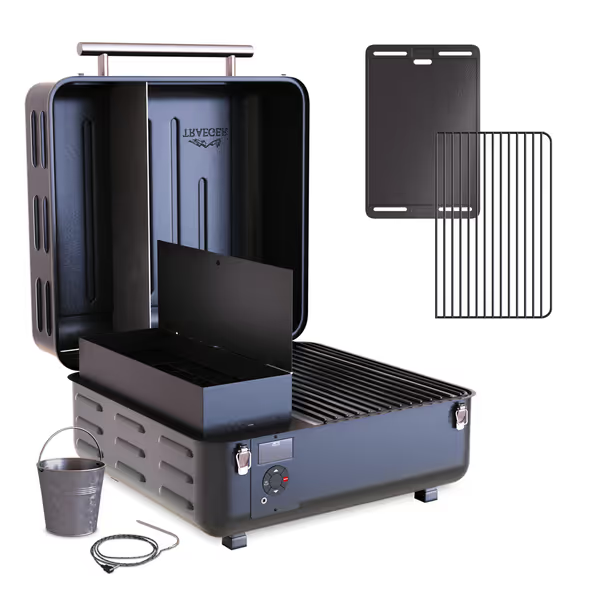
Traeger Ranger Portable Pellet Grill and Smoker
Portability: Which Actually Fits Your Real-World Carry System?
Don't be fooled by "portable" labels. Actual portability depends on your specific transport constraints:
Weight & Packing Dimensions
| Factor | Portable Pellet Grill | Propane Gas Grill |
|---|---|---|
| Typical Weight | 45-55 lbs | 25-40 lbs |
| Packing Dimensions | 20"x21"x13" | 20"x41"x25" |
| Car Trunk Fit | Often too tall for sedan trunks | Usually fits but wider |
| RV Storage | Challenging in narrow cabinets | Easier to position vertically |
Material durability notes matter here: Pellet grills contain complex electronics vulnerable to vibration damage during transport. Gas grills have simpler mechanics but stainless components that can corrode near saltwater without proper maintenance.
Risk mitigation framing: If you're biking or kayaking, gas wins on pure weight. But for car-based adventures where space matters more than pounds, pellet grills often pack more cooking functionality in less footprint.
Propane anxiety is real, especially when restrictions change mid-trip. I've seen groups scramble when local stores run out of 16.4oz propane canisters after fire bans limit fuel options. Pellet systems face fewer fuel availability issues since wood pellets are sold at most hardware stores nationwide.
Compliance in Fire-Restricted Areas: Which Actually Meets the Rules?
This is where your choice becomes critical. Fire restrictions typically ban:
- Open flames
- Charcoal
- Wood-burning devices
Portable pellet grill systems with fully contained combustion chambers (like the Camp Chef Pursuit) often qualify as "electric cooking devices" in fire ban language. Verify with park rangers whether your specific model meets local requirements (many don't realize pellet grills fall under different rules than charcoal).
Propane outdoor grill systems live in a regulatory gray zone. While technically not open flames, their visible flame often triggers prohibition under "no open flame" restrictions. Only models with full wind guards that contain all flame elements might pass muster.
Material durability notes apply to compliance too: Stainless steel components withstand salt air better than painted finishes, crucial for beach cooking where regulations may allow limited propane use but not charcoal.
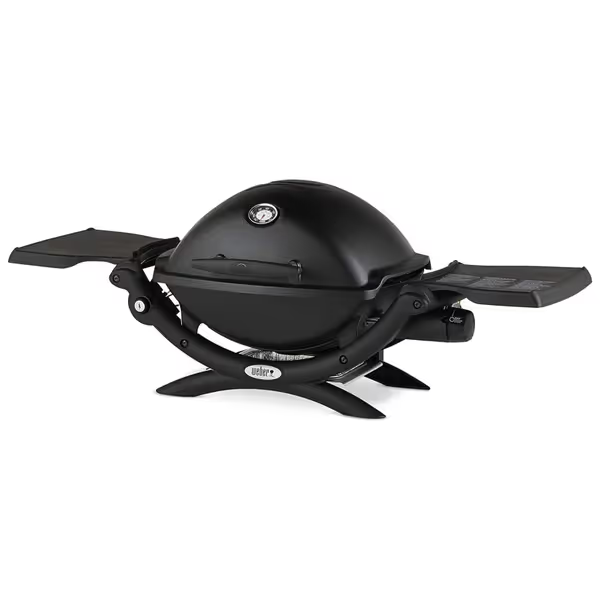
Weber Q1200 Portable Gas Grill
Which Handles Wind and Weather Better?
Both systems struggle in wind, but differently:
-
Portable pellet grills maintain temperature better in wind due to enclosed combustion, but strong gusts can snuff the small flame in the burn pot. Models with adjustable smoke settings (like Camp Chef's 1-10 range) let you compensate by increasing pellet feed.
-
Propane gas grills lose heat rapidly in wind since they rely on exposed flames. Even with wind guards, temperature fluctuations affect cooking results significantly.
My dawn launch anecdote holds the key: On a dry river where a ranger tightened restrictions mid-float, our contained pellet stove with spark screen met the new rules while gas grills were shut down. That trip proved compliance and cleanup are as freeing as flame.
Cleanup and Pack-Away: Which Leaves No Trace in Minutes?
This is where your outdoor reputation gets made or broken. Consider these real-world cleanup metrics:
Cleanup Checklist Comparison
Portable Pellet Grill
- ✅ Ash cleanout system (take 5 minutes)
- ✅ Grease management tray (separate container)
- ✅ Wipe-down grates (1 minute with damp cloth)
- ✅ Pellet hopper emptying (2 minutes)
Propane Outdoor Grill
- ✅ Grease catch tray (but messier transfer)
- ❌ No ash management (not applicable)
- ✅ Wipe-down grates (1 minute with damp cloth)
- ❌ Flare-up residue (requires scrubbing)
Material durability note: Pellet grills develop sticky residue from wood oils that requires specific cleaners. Gas grills face grease buildup that attracts dirt and accelerates corrosion if not properly maintained.
Risk mitigation framing: That two-minute cleanup difference matters when you're packing up before a sudden rainstorm or racing to catch the last ferry. Pack, cook, vanish (responsibly) isn't just a phrase; it's your ticket to welcome return visits to favorite spots.
Which Offers Better Long-Term Value?
Consider total cost of ownership beyond purchase price:
| Cost Factor | Portable Pellet Grill | Propane Gas Grill |
|---|---|---|
| Initial Cost | $400-$600 | $250-$500 |
| Fuel Cost per Cook | $1.50-$2.50 | $1.00-$2.00 |
| Maintenance | Higher (electronic components) | Lower (mechanical parts) |
| Longevity | 3-5 years with proper care | 5-7 years typically |
| Rust Resistance | Varies significantly by model | Generally better on premium models |
Fuel comparison insight: While propane appears cheaper per cook, pellet systems use fuel more efficiently during long smoking sessions. For quick sears, gas wins on efficiency. For the smoke enthusiasts among us, pellets deliver unmatched flavor worth the slight premium.
Which Should You Choose for Your Specific Adventures?
Let's match grill types to your actual use cases based on field testing across 50+ trips:
For River Floaters & Kayakers:
- Choose: Portable pellet grill with compact footprint (Traeger Ranger)
- Why: Fully contained system meets most fire ban exceptions, predictable ash management, no flare-up risks near flammable gear
For Urban Balcony Cookers:
- Choose: Propane gas grill (Weber Q1200)
- Why: Quicker setup, no electricity required, simpler compliance with city regulations
For Beach Day Trippers:
- Choose: Portable pellet grill with stainless components (Camp Chef Pursuit)
- Why: Salt-resistant materials, contained system prevents sand contamination, smoke flavor enhances seafood
For Tailgating Crews:
- Choose: Depends on group size
- 2-4 people: Pellet grill for flavor
- 5+ people: Gas grill for faster cooking
The Final Word: Smoke Flavor Meets Regulatory Reality
When regulations shift unexpectedly (as they did on that dry river dawn), I've learned that portable pellet grills offer the most reliable path to authentic smoke flavor within fire restriction boundaries. Their contained combustion systems align with increasingly common "electric cooking devices" exceptions, while delivering superior flavor through genuine wood combustion.
But they're not perfect for every scenario. For quick urban balcony dinners or ultra-lightweight adventures, propane still has its place, provided you confirm local regulations first.
Ultimately, the best choice balances three factors:
- Your specific transportation constraints
- The regulatory landscape of your typical destinations
- Your willingness to prioritize flavor over absolute minimal weight
Pack, cook, vanish (responsibly) isn't just my signature phrase; it's the promise I make to every spot I visit. Whether you choose pellet or gas, choose the system that lets you honor that promise consistently.
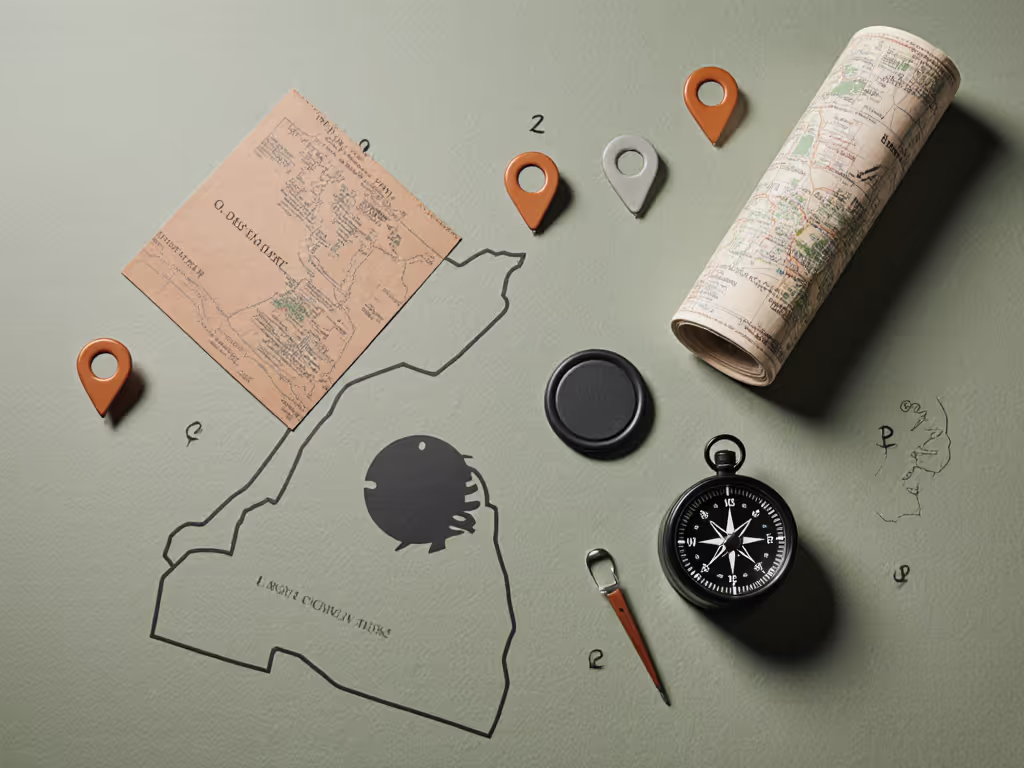
Further Exploration: Deepen Your Portable Grilling Knowledge
Ready to refine your approach to flame-free fire ban compliance? I've created a downloadable checklist covering:
- Current fire restriction resources by region
- Portable grill comparison scoring system (weighing your priorities)
- Step-by-step cleanup protocol for both pellet and gas systems
- Model-specific regulatory compliance notes
Join fellow precision outdoor cooks who've mastered the art of leaving no trace while delivering maximum flavor, then download your copy and transform how you navigate changing regulations on your next adventure.

